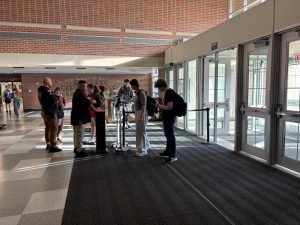Staff Editorial: Intentional thinking over irrational action
February 27, 2020
“I’m lowkey scared to eat from this Chinese Place because what if one of them is affected by Coronavirus,” one person tweeted on Feb 7, mimicking the fear of many others.
This tweet is just one of the examples of the pandemic of misinformation that comes with an epidemic of disease. When the news broke about Coronavirus, the threat of infection rushed to the forefront of everyone’s mind.
Social media posts contributed to the fear-mongering.
Mass criticism of others and poor decision making is common. For example, cases in South Korea multiplied over a week. The majority of the cases are credited to a fringe religious group, the Shincheonji Church of Jesus. Critics blamed the church’s practices and believe the church refused to cooperate with government officials. However, the church has released a statement claiming they are fully cooperating with officials.
This process of victim-blaming only leads to more hysteria and panic. These actions have not been based on scientific reasoning, rather they come from the primal reaction of fear. They demonstrate the lack of reasonable thought and action in society. In a time of crisis such as this, the only decisions that should be made are reasonable scientific ones.
When people choose to tweet and make social media posts with their assumed knowledge, they contribute to the spread of misinformation and fear. Students who responded to an Omega poll revealed that 66.2% of students received information about Coronavirus through social media. Students are educating themselves on information that is not always factually accurate.
Today’s society has become obsessed with the rapid consumption of media. In this pursuit, we have forgotten to thoroughly evaluate the information we see. This leads to a cycle of misinformation causing hysteria and the misinformed people choose to remain ignorant.
It is irresponsible to society to simply write tweets about conspiracy theories, like Tim Kennedy who tweeted, “Something is happening with the #coronavirus in #China that they are not telling us. This is eerily similar to #Chernobyl. #communism.” This tweet was liked over 3,000 thousand and retweeted over 300 times. Making light of a dramatic issue might, at first, come off as funny but, in reality, it shows a lack of understanding in society and a lack of caring.
Writing ignorant or racist tweets and memes foster hysteria and panic about an exaggerated issue.
A large part of understanding the gravity of this issue comes from understanding how interconnected our world is. An epidemic in China leads to worldwide repercussions. Secretary of Commerce Wilbur Ross who spoke about the Coronavirus outbreak on Jan 30 on Fox News stating, “I think it will help to accelerate the return of jobs to North America.” In reality, the global market has dropped, with the Dow Jones losing over 900 points. Not only was his remark factually inaccurate it was also insensitive to those affected.
An epidemic in China is not contained in China. While part of this is due to a large amount of travel and physical interaction across the world it also due to the interconnectedness of our economy and social life.
Misinformation stems from the lack of awareness of our part in a larger, global society. When confronting a large scale crisis such as this, it is necessary for people to arm themselves with information before spreading information. Deliberate thinking about a disease can lead to deliberate action.























